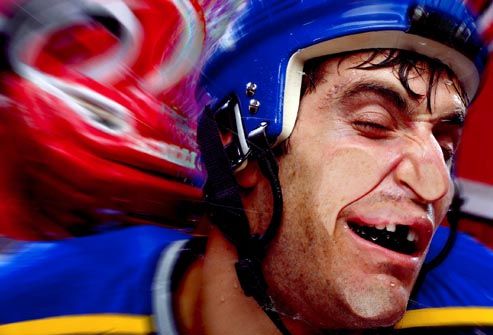Jay is a 15 year old passionate basket ball player. But one day, while playing, he slipped and broke his front teeth in the accident. His chipped tooth used to bleed and became quite sensitive. The half broken teeth made Jay feel quite conscious while smiling and interacting with friends. The result of which he started losing self confidence...
 Image Credits: WebMD
Image Credits: WebMD
"According to the Academy of General Dentistry (AGD), soccer players are more likely than football players to sustain a dental-related injury."
Dentists come accross many such cases like Jay, since injuries to the teeth and mouth are common. Sometimes adults lose or break their teeth in accidents or sport injuries whereas young children may get an injury while learning to walk or while playing michief.
As per WebMD - “Approximately 80% of dental injuries affect one or more of the front teeth and may cause damage to soft tissues – the tongue, lips, and inner cheeks.”
Even biting on a piece of a hard food can cause teeth to crack. Mouth injuries resulting in broken, knocked out or dislodged tooth, needs medical attention. Such problems if left untreated can give rise to dental emergency and can lead to serious complications. Therefore, it is important to visit the dentist.
Here are few tips to prevent such trauma and some methods to restore injured or broken teeth.
Tips to Prevent Sports-Related Tooth and Mouth Injuries
Even if a tooth is broken, often times it can be saved if you get to a dentist quickly. Minor chips and cracks can be repaired by using tooth-coloured materials that are nearly as strong as the original tooth.
But dentists always recommend protecting yourself while enjoying sports or other high-risk activities.Here are few ways-
- Wear Mouth Guards to protect your teeth and mouth.
- When playing baseball catcher or hockey, wearing face cages protects against trauma to the face.
- Helmets will not only protect your teeth and mouth but also another important area – your head, to help protect against brain-concussion.
Can Knocked-Out Teeth Be Repaired?
Broken teeth can be repaired however, there is a good chance of saving your teeth if attented immediately by a dentist. If a tooth has been shaken out, gently rinse any debris from the root and attempt to place it back into the socket. If that’s not possible, hold it in the mouth on the way to the dentist. If everything fails, keep the tooth in milk until you get to the dentist's office. Do not worry if your tooth cannot be saved. You can still restore your smile due to advancements in dentistry. Dentist use dental implants or artificial tooth which is anchored directly onto your jawbone. The porcelain crown is attached to it which helps you in biting, chewing, and for other aesthetic reasons.
Seasonal Activities that Could Lead to Dental Injuries
Here are several seasonal activities that could lead to dental injuries and ways to keep your smile safe:
Swimming
Chemically treated water in the pool can form organic deposits developing yellowish-brown or dark brown stains known as "swimmers' calculus," on the teeth. So, frequent swimmers are advised to go for professional dental cleaning to get sparkling tooth back.
- Scuba Diving
Due to the air pressure change involved in scuba diving and as the divers bit too hard on their scuba air regulators, Scuba divers can develop "diver's mouth syndrome”. This is usually caused due to change in air pressure, particularly if a diver has a big cavity, gum disease, a temporary filling, periodontal abscess or incomplete root canal therapy.
One of the best way to avoid these problems is to visit your dentist before and ensure your dental health before diving.
You can ask your dentist's advice about fitting the mouthpiece of an air regulator.
Contact sports (Soccer, Softball, Basketball, etc.)
Such sports carry more risks of facial and dental injury. When participating in such sports, make it mandatory to wear a mouth guard to prevent damage to braces or other orthodontic work, as well as prevent mouth cuts, jaw injuries and tooth damage.
There are several types of mouth guards.
- Stock mouth guard
- Mouth-formed protectors
- Custom-made mouth protectors
Ask your dentist about which of the above will be a perfect solution for you.
Comments